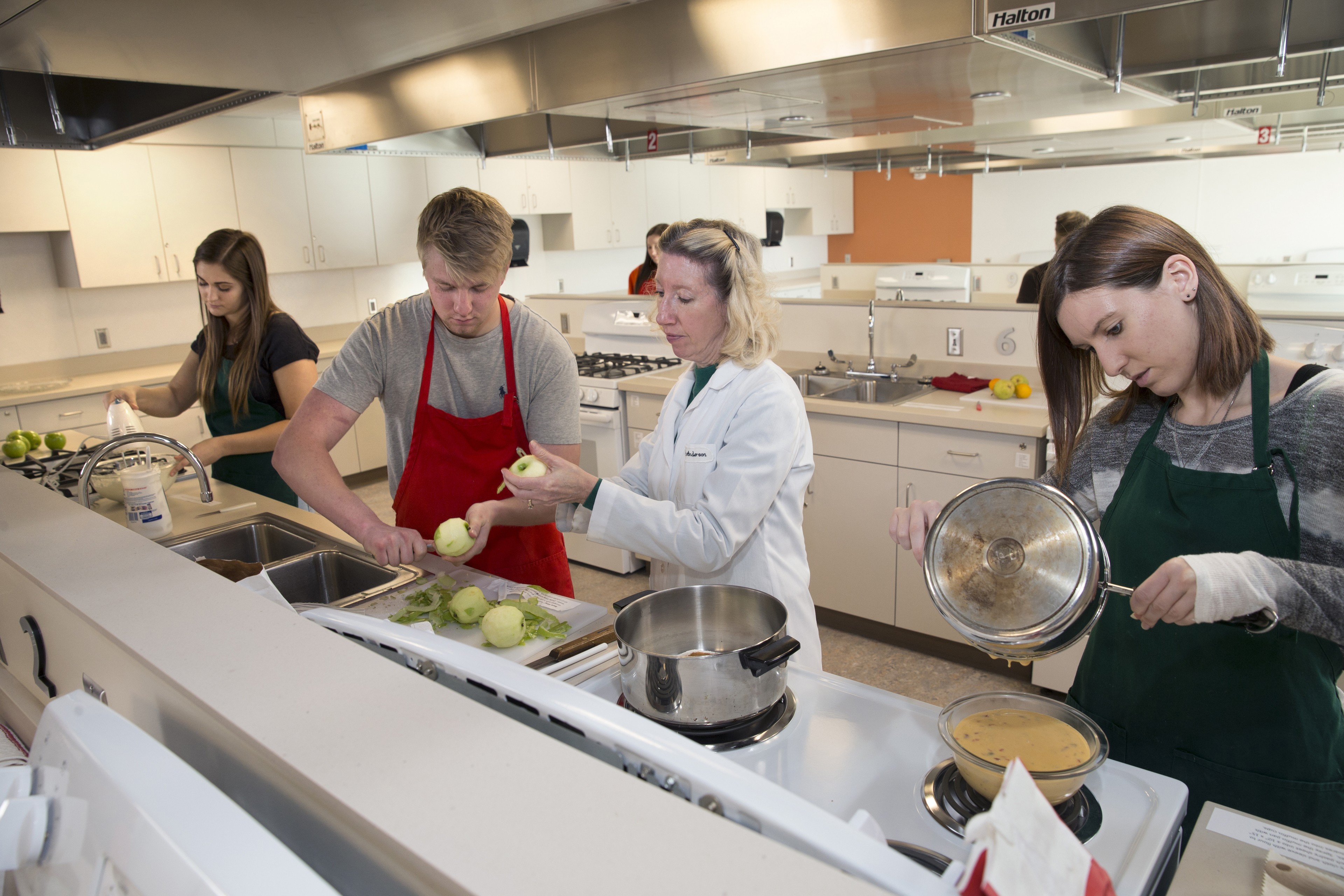
Bachelor of Science (B.S.)
Dietetics
The BGSU dietetics bachelor’s degree program is your first step to becoming a registered dietitian. You’ll learn about the science of food and its role in preventing and treating disease and maintaining health. Laboratory and hands-on experiences are an integral part of our science-based curriculum.
To become a registered dietitian nutritionist (RND), you must have a master’s degree, complete an accredited dietetics internship and pass the national registration examination. Our bachelor’s degree program gives you a solid foundation to do that successfully.
Why study dietetics at BGSU in Ohio?
- Hands-on learning with the latest technology. Work in a new 14-unit food preparation lab and a new chemistry lab for physical and chemical analysis of foods. Our cutting-edge technology includes software for nutritional analysis, menu planning and food service management.
- Tailor your degree to your goals. Every dietetics major takes an intro course that helps you identify goals and chart a path forward.
- Meet your peer mentor, who’s there to guide and support you.
- Engage in professional development and team building.
- Meet University staff who can connect you with resources.
- Small class sizes. Our active and engaged faculty members – who also serve as advisors – know you and your goals. Our job is to help you find opportunities that will help you achieve them.
- Active learning. Our coursework isn’t all about lectures. We believe you learn better when you’re engaged in activities, projects and discussions. This helps you graduate with the skills and confidence you need to contribute as a team member in a supervised practice.
- Record of success. Internship directors consistently rank our graduates highly when evaluated against their peers. Our graduates easily transition into the workforce and into professional settings from accredited supervised practice programs to graduate and professional school.
- Undergraduate research. Conduct research with food and nutrition faculty and BGSU faculty in biology, chemistry, exercise science and public health.
- Network. Learn from professionals working in community health, public health agencies, clinical nutrition settings and the food industry.
- Accreditation. Our bachelor’s degree program is fully accredited by the Accreditation Council for Education in Nutrition and Dietetics (ACEND) of the Academy of Nutrition and Dietetics.
- Active student organization. The Student Nutrition Association (SNA) offers you professional opportunities and education about current issues in the field. Our members are active in the community and contribute to the Annual Public and Allied Health Symposium.
Career – what can you do with a dietetics degree?
With rising obesity and our diet’s larger role in preventing and managing disease, careers as dietitians and nutritionists are growing much faster than the national average for other occupations.
Most graduates of our bachelor’s degree program go on to an internship program and graduate school to become registered dietitians.
Some choose to get clinical, paid experience as dietetics technicians or dietary managers before moving on to a master’s program. To be eligible for these positions, you must pass the Nutrition and Dietetics Technician, Registered (NDTR) exam or the Certified Dietary Manager (CDM) exam after obtaining a bachelor’s degree from an ACEND-accredited program.
Career paths
- Clinical dietetics
- Food and nutrition management
- Private practice nutritionist
- Consultant dietician
- Health educator
- Public health nutrition
- Clinical nutritionist
Quick Facts from the Bureau of Labor Statistics
Curriculum
You will take courses in mathematics, chemistry, biology, nutrition and food science.
Coursework will include supervised hands-on experiences with on- and off-campus nutrition professionals[CS1] . You will learn to use critical-thinking skills that will prepare you for a career in a variety of settings:
- Clinical – hospitals, medical facilities, etc.
- Community – sports teams, public health departments, etc.
- Management or leadership positions
You are strongly encouraged to obtain paid or volunteer experiences in the food and nutrition field. Dietetics students often complete service at:
- Wood Haven Health Care
- Wood County Hospital
- Wood County Public Health Department
- Wood County Senior Center
- Other regional healthcare facilities
.jpg)
Sample courses
- Experimental Foods
- Introduction to Human Nutrition
- Medical Nutrition Therapy
- Advanced Nutrition
- Exercise Physiology
- Nutritional Assessment
- Food and Culture
Becoming a registered dietitian
To become a registered dietitian, you must:
- Complete a bachelor’s degree and earn a verification statement from an accredited dietetics program
- Earn a master’s degree
- Complete an accredited dietetics internship
- Pass a national registration exam
BGSU has master’s and internship programs.
After completing master’s and internship programs and passing the national exam, graduates are eligible for licensure in most states. In Ohio, graduates also must obtain licensure with the Ohio Board of Dietetics to practice.
The Dietetics program is part of the Department of Public & Allied Health in the BGSU College of Health & Human Services
Accreditation
Bowling Green State University [BGSU] is accredited by the Higher Learning Commission. BGSU has been accredited by the Higher Learning Commission since 01/01/1916. The most recent reaffirmation of accreditation was received in 2022-2023, with our next reaffirmation of accreditation scheduled for 2032-2033. Questions should be directed to the Office of Institutional Effectiveness.
Request Information
Updated: 09/06/2024 02:09PM

